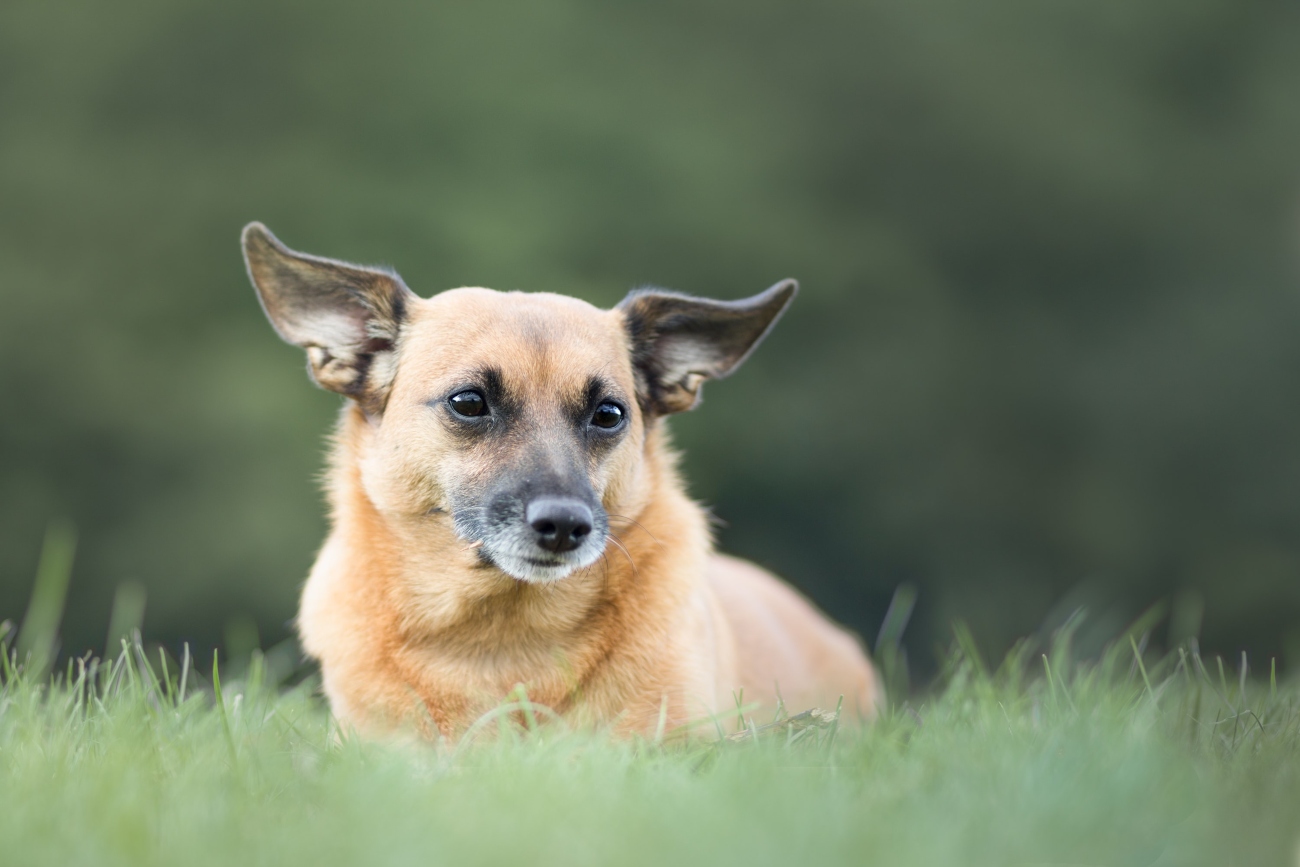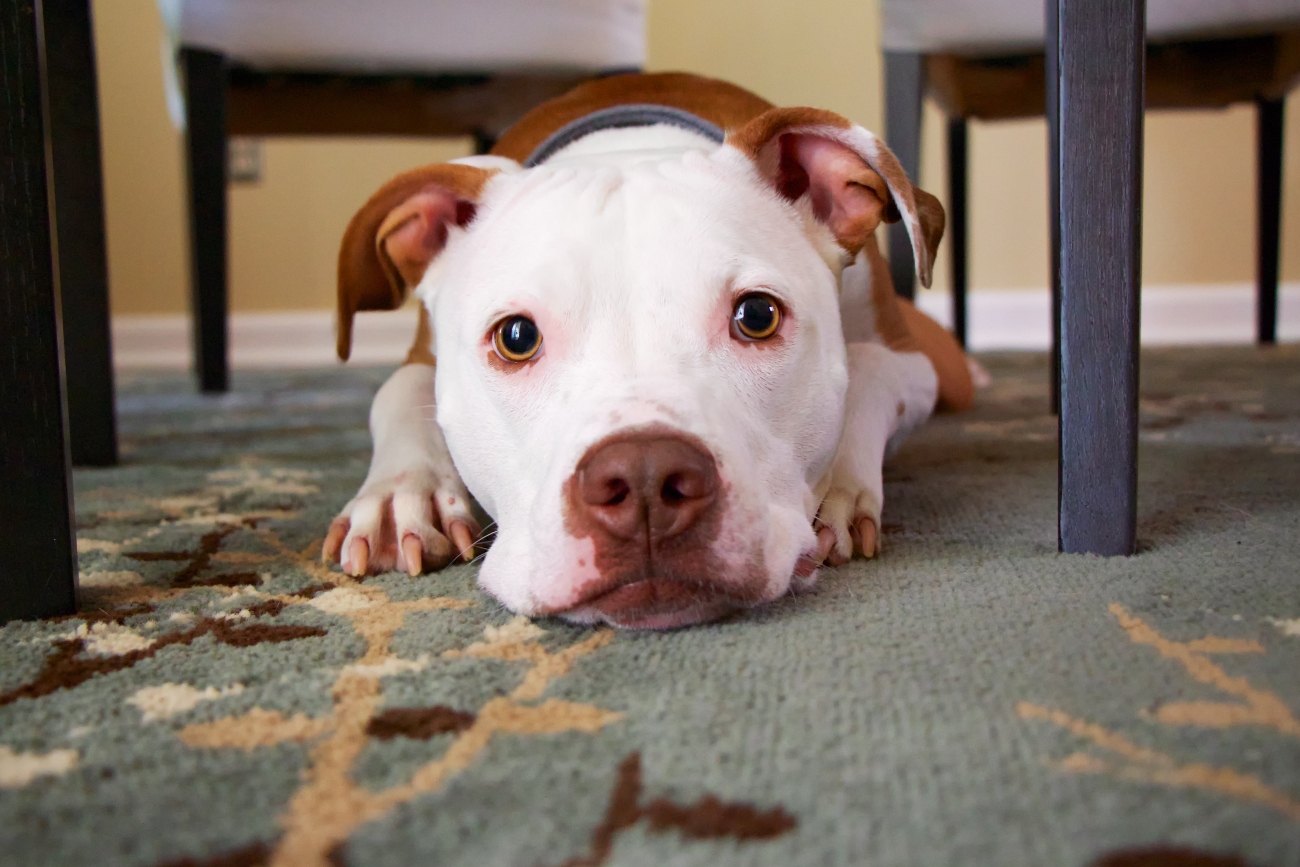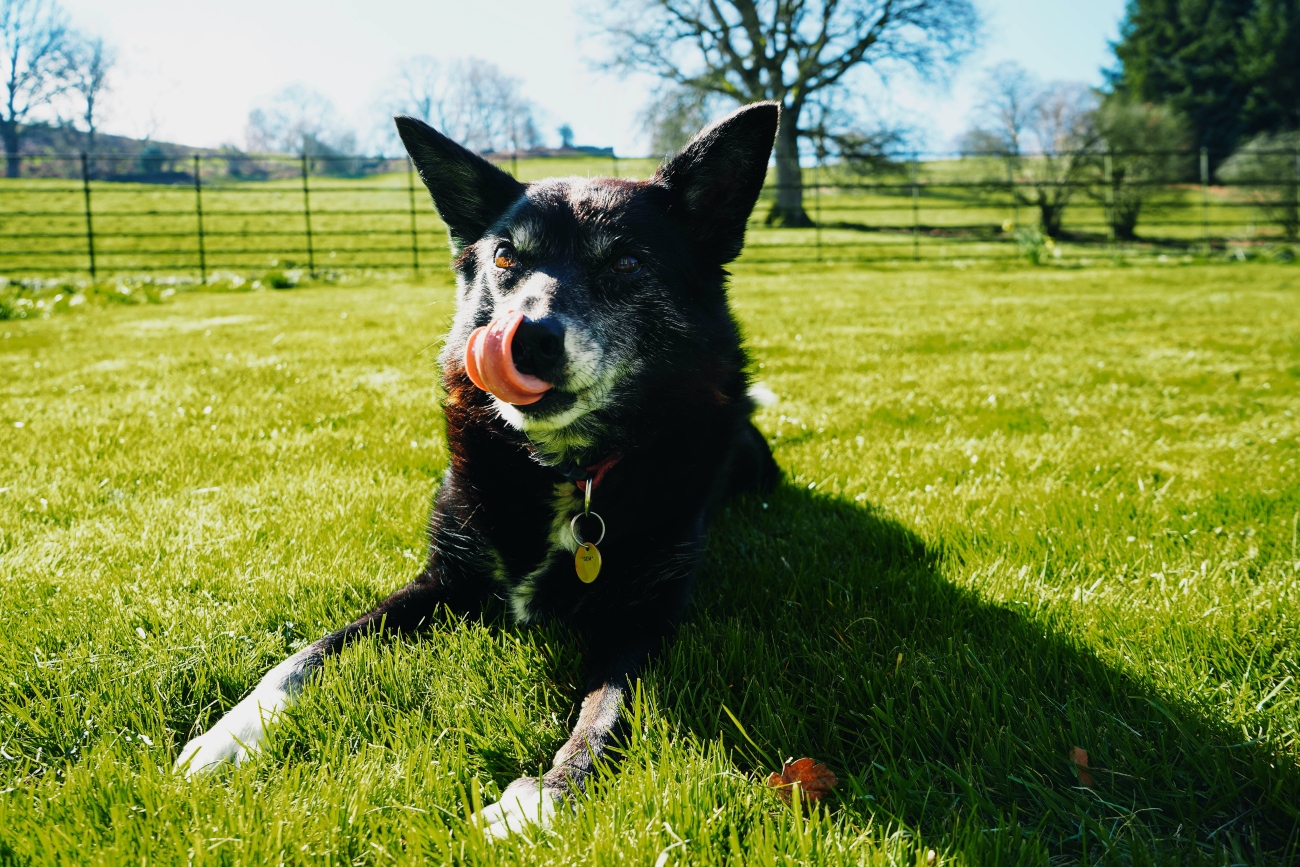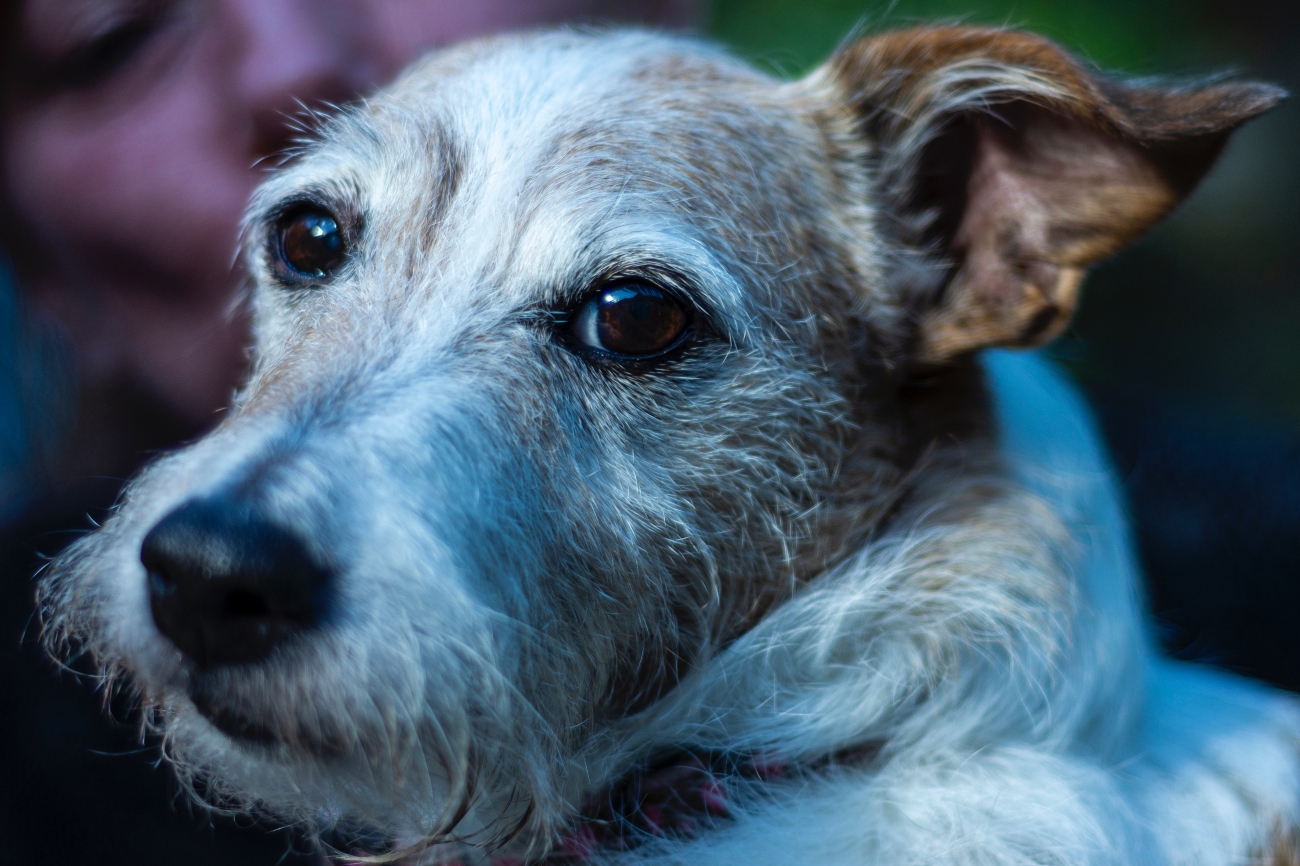
What does older dog insurance cover?
9th February, 2022
Dogs deserve to be healthy and happy throughout their lives. Dogs are considered middle-aged at around seven years but the average life span is 14 years, so your pet will spend a large proportion of its life as a senior.
The likelihood of illness increases as your pet ages, so it’s important to have the right protection at every stage. In this article, we’ll look at the common health problems older dogs can develop as well as what older dog insurance covers, and how you can choose the right policy for you.

How long do dogs live?
According to the Guinness Book of Records, the oldest dog on record was an Australian cattle-dog called Bluey who died at the ripe old age of 29 years and five months. The average dog lifespan is 14 years, however individual pets could live much longer or shorter than this.
As the PDSA explains, life expectancy varies with breed and size of dog. Large dogs tend to have shorter life spans of around 5-13 years, while medium-sized dogs live for 8-13 years and small dogs live for 7-14 years.
According to the RSPCA, the average lifespan of a miniature poodle is 14 years, compared to Dogue de Bordeaux with an average lifespan of just 5.5 years.
Of course, sadly any dog’s life can be cut short. The most common cause of death for dogs under three years is behavioural issues (14.7%), gastro-intestinal problems (14.5%) and car accidents (12.7%). For older dogs, the most common causes of death are age-related: cancer (18.2%), arthritis (12.4%) or neurological conditions (11.6%).
Opting for an older dog instead of a puppy
We all know that puppies are adorable, but older dogs also have a lot to offer. The grizzled, time-worn look of old dogs has its own charm and they often have tons of character and personality, as well as endearingly odd habits. If you’re planning to adopt a dog, it’s worth thinking about whether an older animal might be suitable for your home.
The sale of puppies increased dramatically during the pandemic, with 3.2 million households buying a dog since the start of the crisis. There are now 17 million pet-owning homes in the nation. The vast majority of these dogs have found happy homes, but around 5% of new owners have already given up their pandemic pups. One third of new owners said having a dog was like caring for a baby.
All this means there will be many dogs who were bred or adopted during the pandemic who are looking for new homes in the next few years. It’s well worth considering whether an older dog might fit into your life better, rather than choosing a puppy.
Key considerations in adopting an older dog
If you’re not sure whether to go for an older dog or a young puppy, let’s look at some of the key considerations that should shape your decision.
1. You will be doing a good deed
This shouldn’t be your only consideration, but there’s no doubt that many dogs end up being put down in rescue centres when they could have many happy years left.
2. Older dogs are not necessarily ‘problem’ dogs
It’s a common misconception that older dogs are put up for rehoming due to behavioural issues, but many animals are rehomed through no fault of their own.
3. An older dog will have a shorter life span
If you’re not sure you want to commit to a full 16 years or more with a dog, an older animal can give you years of pleasure without you needing to plan decades ahead.
4. Enjoy a calmer dog ownership experience
Younger dogs can be very lively and exhausting. Welcoming an older dog into your home can be a smooth, calm experience without all the jumping and yapping.
5. Your dog’s personality will be more developed
With an older dog, you can have more certainty about character traits. Adopting a puppy is a leap into the dark because you never know how the pup will turn out.
6. You will probably have less training to do
Older dogs can be taught new skills and trained, but they should have basic commands down by the time they reach seniority, so you save all that time on training.
7. Skip the destructive puppy stage
Don’t fancy having your belongings chewed regularly? Any dog can exhibit destructive behaviours if they get distressed, but older dogs are much less likely to tear things apart for the fun of it!
8. Older dogs can be great company
Senior dogs are great companions – they are often happy just to chill out with you and snuggle up. They can be great company without needing the time investment a younger dog needs.
9. Older dog insurance protects you financially
If the health issues of older dogs are a concern for you, it’s worth remembering that dogs of any age can develop health conditions. An older dog that is well cared for can have many healthy, happy years and senior dog insurance will protect you against unforeseen costs if they do develop a condition.
How do you keep an older dog healthy?
The best way to prepare your dog for a healthy old age is to take good care of them. Preventative care during the earlier stages of your pet’s life will set them up for the golden years.
Good care includes:
- Choosing a pet bred from healthy parents and a responsible breeder
- Keeping up to date with vaccinations
- Ensuring your pet is given worming treatments regularly
- Keeping your dog free from fleas and other parasites
- Giving your dog a healthy diet and maintaining a healthy weight
- Ensuring your pet has the right amount of exercise and stimulation
- Neutering your dog at the point recommended by your vet
- Not overbreeding (having too many litters in too short a time)
- Checking out any issues with the vet promptly
- Insuring your dog so any problems can be addressed quickly, regardless of cost
Just like humans, dogs change and develop through their lives and you may find your pet’s habits shift as they get older. An older dog might want more rest and a quieter environment free from sudden disturbance or loud noise.
This is particularly true if your dog has problems with sight or hearing. Walking less means your dog’s nails will wear down less, so you may find they need more frequent trimming.
Older pets might need to urinate more often, and they may need a slightly different diet to adapt to their needs. This could include restricting calories to prevent weight gain and associated problems. Any sudden changes in a pet’s eating habits or weight should be reported to a vet as it can be a sign of underlying issues.
The ‘use it or lose it’ principle applies to dogs as well as people – canines need fresh air, exercise and mental stimulation to keep them in good form and to maintain mental and physical fitness.

Common senior dog health problems
Senior dogs are prone to particular health conditions. Many of these can be resolved or improved with vet care, so be sure to mention any changes to your vet.
The most common health conditions in older dogs are:
- Arthritis
Over time, weight-bearing joints such as hips, shoulders and knees begin to lose cartilage, causing pain and restricted movement. There is no cure for osteoarthritis in dogs, but treatments can slow its progress and reduce discomfort.
- Kidney disease
Age takes a toll on the kidneys, with a slow process making the kidneys less efficient and developing to full renal failure. Again, this is an incurable condition but there are many treatments that maintain quality of life and slow the disease’s progression.
- Deafness
Older dogs often lose their hearing. This might make them appear disobedient or confused, but teaching your pet some simple hand signs can ensure you can still communicate.
- Blindness
Sight can change in older dogs due to degeneration or diseases such as cataracts. Many conditions can be treated, or dogs with limited vision can adapt and learn to enjoy their life by memorising the layout of your home and staying on the lead for walks.
- Dementia and cognitive problems
Old age can cause brain deterioration in dogs, with symptoms such as confusion, pacing, distress, vocalisation, reduced interaction with humans, incontinence and sleep changes. These can be signs of other illnesses, so check with your vet.
- Cancer
The likelihood of cancer increases with age and generally the sooner a problem is found, the better the prognosis. Routine check ups can pick up issues, as well as gentle grooming to spot any unusual lumps or bumps.
- Tumours and growths
As dogs get older, they may develop growths, moles, and fatty tumours. These are likely to be benign but should always be checked to rule out cancerous growths. If they are benign and not causing discomfort, they can often be left as they are.
Physical changes make it harder for senior dogs to control urination until a suitable time. Incontinence can be an indication of other diseases, so always ask your vet. If the problem is simply due to old age, more frequent urination breaks can prevent puddles indoors.
- Obesity
As dogs slow down and may develop joint pain or other conditions, it’s easy for their weight to climb due to reduced activity. Added weight can make health problems such as arthritis worse, so it’s important to stay on top of your dog’s diet and adjust it where required.
Being in tune with your pet and watching out for any physical changes will help you to pick up on any problems early. For example, weight changes, smelly breath, fatigue, coughing, changes in toilet habits or balance problems can all be a sign that something could be wrong. Some vet practices run special senior dog programs of regular check ups to meet the needs of older dogs more effectively.
As a policyholder with Petwise, you can also call the dedicated Vet Helpline for help or advice.
Managing dental care for older dogs
Up to 80% of older dogs experience dental problems. Pain can make dogs distressed and unsettled, as well as potentially leading to serious issues, for example if gum disease leads to bacterial infections in other parts of the body.
Keeping your dog’s teeth clean is of the utmost importance. To address any residual issues, for example tartar build-up, your dog should firstly have a professional clean. This might be under general anaesthetic if the issues are severe enough and anaesthetic is appropriate in the circumstances.
Once the teeth are clean, you can maintain them using canine tooth cleaning products. This includes dog toothbrushes and toothpaste. The vet should check your dog’s oral health around twice a year.
Cleaning your dog’s teeth might be easier said than done – many pets are resistant to anyone coming too close to their mouths, especially if they have experienced toothache recently. With a little patience, your older dog can be trained to be more comfortable with you touching their mouth: start by stroking the head and, over time, beginning to touch them on the chin, lips and teeth. You should always stop if your dog shows resistance or anxiety.
Using a chew toy can help to work your dog’s jaw muscles and loosen food debris around the teeth. You should also ensure a healthy diet as the wrong foods can increase the chances of tooth decay.
If you suspect a dental problem in your dog, get it checked at once. Signs include discomfort, smelly breath, red, swollen or bleeding gums, loss of appetite and discoloured teeth. The longer you leave it to get help, the worse the problem is likely to be for both your pet and your wallet, which is why older dog insurance is so essential.
Older dogs and lameness
As they get older, dogs can often develop stiff joints and lameness. There are a number of different causes for this, so it’s worth having a vet assess your pet to decide if treatment is needed. If your dog suddenly develops a limp or stiffness, you should contact your vet as a matter of urgency.
Stiffness and lameness can present in various forms. A dog might start to walk more slowly, have an unusual gait with a limp or stiff step, be reluctant to jump or climb, or seem stiff after long walks or resting. A dog might also have swelling in the legs and joints or groom a particular spot repeatedly, indicating pain at that point.
Lameness is generally a sign of a problem in a dog’s legs or back. This could be due to arthritis or a minor injury, for example a sprain or dislocated joint. Conditions that affect the joints include dysplasia of the hips, elbows and shoulders, tendon injuries and knee problems.
Mobility issues can also be caused by problems with the nervous system, muscles, cancer or bone tumours. Back pain can be caused by a slipped disc, particularly in longer dog breeds. At any age, dogs can injure their claws or get a splinter stuck in their paws, leading to lameness.
Maintaining your dog’s mood
Senior dogs can sometimes be a bit grouchy, which is understandable given their age. However, some tender loving care can turn things around and make your dog love you all the more.
Understanding how it feels to be your dog is important. If they have reduced vision or hearing, your pet might get confused by things moving around, or being in cluttered spaces. Organising your layout to make it easy for your dog to get around can help.
Sensory issues also mean your dog may feel vulnerable and defensive, for example if they are touched suddenly. Making a warning sound or signal as you approach can help to keep your dog calm and notify them of your presence.
Older dogs can have problems with anxiety, for example when visitors enter the home or new dogs are around. If you’re sure there is no underlying medical cause for the anxiety, it can help to provide frequent short walks and mental stimulation such as food puzzles or games to keep your pet occupied. A daily routine will also help to reduce anxiety.

What does older dog insurance cover?
Just as a classic car needs different insurance to a vehicle fresh from the factory, a senior dog needs slightly different insurance to a young pup. As a dog ages, medical problems are more likely and the risk for insurers increases.
Some insurers restrict new policies to younger dogs, so if you’re taking on a senior pet you might want to explore specialist older canine insurance. Insurers look at statistics on risk before pricing premiums, taking many factors into account.
Information that your insurer will look at includes:
- The breed of dog – crossbreeds are usually cheaper to insure than pedigrees
- The dog’s age
- Any pre-existing medical conditions (the cover might exclude these)
- Where you live
- The type of policy (lifetime insurance, accident-only, time-limited or full benefit)
- The excess
- Claims history
What is covered by Petwise insurance for older dogs?
Petwise older dog insurance helps to keep your dog fit and healthy right into old age. The policy has been developed especially to meet the needs of older dogs, covering common problems such as dental issues, cancer, obesity, arthritis and kidney disease.
The cost of care for these conditions can be significant, making insurance vital to avoid having to pay large bills with little warning, potentially for years. There is no upper age limit – dogs of all ages over seven years are welcome.
Petwise cover includes a contribution towards a specialised senior food diet, dental cover as standard and farewell cover to contribute towards the cost of your pet being put to sleep and buried or cremated. Bills can be settled directly with your vet, saving you the hassle and inconvenience of having to cover the cost yourself.
It’s a sad fact of life that your dog’s life will come to an end at some point. As animal lovers ourselves, the team at Petwise understands that this is a very painful time, which is why we offer a bereavement hotline to provide support and understanding for our customers. The professional, confidential service is open 24 hours a day, 365 days a year so you can share how you feel whenever you need to.
To give you clarity, Petwise applies only a fixed excess of either £149 or £199, regardless of the age of your pet. If treatment is not covered under your policy, Petwise will give you written confirmation of this.
Many older dogs will have a pre-existing condition, which can make it very hard to find pet insurance. This is the case even if the condition is asymptomatic and well managed. This can make it impossible to secure cover for senior dogs, at a period when vet treatment could run into the thousands.
A key feature of Petwise insurance is that pre-existing conditions are covered, so long as the pre-existing condition was asymptomatic for at least two years prior to taking out the policy. If you can show you have previous insurance lasting until the policy start date, there is no waiting period for the cover to begin so you’ll have continuous protection.
What treatments are commonly excluded under older pet insurance?
Common exclusions to older dog cover include:
- Pre-existing conditions - Petwise stands out from competitors in covering pre-existing conditions that have been asymptomatic for two years.
- Some administrative charges, such as vet fees for completing forms.
- Routine, elective or preventative treatments, e.g. spaying or neutering, vaccinations, flea treatment, worming and pregnancy.
- Certain breeds cannot be covered.
- Dangerous or aggressive dogs are usually excluded.
- Working pets such as sheep dogs are excluded.
Older dogs can bring their owners years of companionship and joy. Protect your senior pup by providing the right diet and exercise, managing health issues well and ensuring you have older dog insurance in place.
Make sure you can afford the cost of care for your beloved pet – get a quick quote for senior canine insurance today.